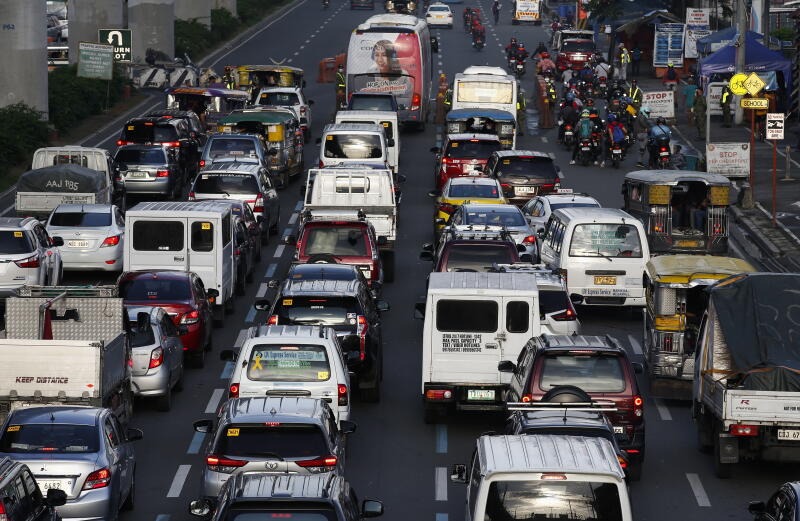The Asian Voice
The future of electric cars in the Philippines: Inquirer columnist
The writer says that if the Philippines emphasises Electric Vehicle policy, it could be a key regional player in the industry.
Sign up now: Get insights on Asia's fast-moving developments

The Philippines senate approved Bill No 1382, or the proposed Electric Vehicles and Charging Stations Act, on May 31, 2021.
PHOTO: EPA-EFE
Cielito F Habito
Follow topic:
MANILA (PHILIPPINE DAILY INQUIRER/ASIA NEWS NETWORK) - Last year, the Covid-19 pandemic depressed global car sales by 16 per cent, and yet electric car registrations actually jumped 41 per cent, according to the International Energy Agency (IEA).
At the end of the year, 10 million electric cars were on the world's roads. Around 3 million electric cars were sold worldwide last year alone, and Europe has dislodged China as the world's largest electric vehicle (EV) market, with 1.4 million registrations against the latter's 1.2 million.
Still, China continues to have the most EVs on the road, with a fleet of 4.5 million, while Europe, with 3.2 million, is catching up fast.
The numbers are more modest (295,000 electric cars sold last year) in the United States, where Big Oil is seen to have traditionally resisted the EV onslaught. Still, their market share increased slightly (to 2 per cent), and electric car registrations did not drop as much as the overall.
With the Biden administration rejoining the world effort to combat climate change, trends in favour of EVs are likely to intensify.
This year, global electric car sales more than doubled (140 per cent) from last year in the first three months alone. Apart from cars, electric buses and trucks have also grown in number in recent years, with global stocks estimated by IEA at 600,000 and 31,000 units respectively.
Clearly, electric vehicles are on track to change the way we all move around, and a drastic reshaping of the land transport industry is on the horizon, especially with the ongoing trend toward autonomous or self-driving vehicles as well.
This is all good news in the effort to arrest global warming to forestall catastrophic climate change, as vehicle emissions are a prominent, if not dominant, source of greenhouse gases in the atmosphere.
We all saw (and welcomed), for example, how blue skies returned in Metro Manila during the weeks of severe lockdown last year as most cars stayed garaged or parked.
The Philippines is well positioned to cash in on the growing trend toward electric cars and EVs in general.
In a recent study for the Philippine Institute for Development Studies, Maureen Ann Rosellon examined the country's strengths and opportunities (along with attendant challenges) in the growing EV market. She finds that the EV industry has strong growth potentials in the Philippines.
Like in other countries where EV growth is rapid, government policy has been generally supportive, although much scope remains to achieve an even more enabling environment.
The Senate recently approved Senate Bill No 1382, or the proposed Electric Vehicles and Charging Stations Act, with the counterpart bill being awaited from the House of Representatives.
Principal author Senator Sherwin Gatchalian explains that the measure will require gasoline stations nationwide to provide EV charging stations, public and private buildings to designate dedicated parking slots for EVs doubling as charging stations, and large industrial, commercial, public transport, and government entities to have a minimum 5 per cent share of EVs in their vehicle fleets.
There will also be fiscal and non-fiscal incentives for the importation, utilisation, and manufacture of EVs. The bill mandates a whole-of-government approach to EV growth and development, starting with formulation of a Comprehensive Road-map on Electric Vehicles led by the Department of Energy.
Ms Rosellon also sees active engagement of industry and private stakeholders as a boon. We already have strong firms in the automotive value chain, especially in wire harnesses, a vital part of EVs.
The Ayala Corporation has already made known its intention to move toward the manufacture of EVs in the country.
However, Ms Rosellon notes that the country still needs to contend with relatively low technology utilisation, general concerns about EV infrastructure, and strong competition for investments.
Vietnam, for one, has also announced plans for EV industry development, and at the rate that country has turned erstwhile ambitious industry plans into reality, the Philippines will have to shape up and step up to be in the game.
All told, we could be a key EV player in the region, but we need to sprint if we want to get there.
- The writer is a columnist with the paper. The Philippine Daily Inquirer is a member of The Straits Times media partner Asia News Network, an alliance of 23 news media entities.

